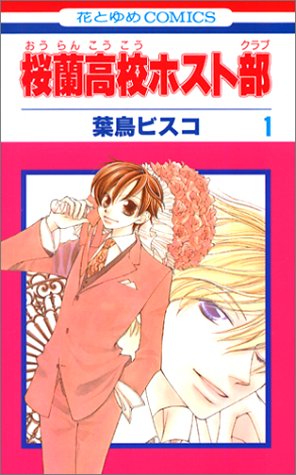Chapter 1 - Part 1
Next Part: Chapter 1 - Part 2
Reading
| Week | Start Date | Chapter | Page Numbers | Page Count |
|---|---|---|---|---|
| Week 1 | May 20th | Chapter 1 - Part 1 | 3 - 26* | 24 |
*ebook offset seems to be -2. So ebook page 3 is physical 5.
Because Ouran doesn’t see fit to have any page numbers at any point, I will include the last panel any time we stop in the middle of a chapter.
Vocabulary List
Please read the guidelines on the first page before adding any words.
Discussion Guidelines
Spoiler Courtesy
Please follow these rules to avoid inadvertent ネタバレ. If you’re unsure whether something should have a spoiler tag, err on the side of using one.
- Any potential spoiler for the current week’s reading need only be covered by a spoiler tag. Predictions and conjecture made by somebody who has not read ahead still falls into this category.
- Any potential spoilers for external sources need to be covered by a spoiler tag and include a label (outside of the spoiler tag) of what might be spoiled. These include but are not limited to: other book club picks, other books, games, movies, anime, etc. I recommend also tagging the severity of the spoiler (for example, I may still look at minor spoilers for something that I don’t intend to read soon).
- Any information from later in the book than the current week’s reading (including trigger warnings that haven’t yet manifested) needs to be hidden by spoiler tags and labeled as coming from later sections.
Instructions for Spoiler Tags
Click the cog above the text box and use either the “Hide Details” or “Blur Spoiler” options. The text which says “This text will be hidden” should be replaced with what you are wishing to write. In the case of “Hide Details”, the section in the brackets that is labelled “Summary” can be replaced with whatever you like also (i.e, [details=”Chapter 1, Pg. 1”]).
Hide Details results in the dropdown box like below:
Example
This is an example of the “Hide Details” option.
The “Blur Spoiler” option will simply blur the text it surrounds.
This is an example of the “Blur Spoiler” option.
Posting Advice
Obs! Do note that the physical version seems to come with zero page numbers (yes, zero, I saw none while flipping through a good portion of the first volume). So alternative means of identifying page might be needed.
-
When asking for help, please mention the page number (if you can), and check before posting that your question hasn’t already been asked. As the threads get longer, it becomes more convenient to use the Search function, which is located in the upper right corner of the forum. It is the magnifying glass which is near your profile picture! The best way to search is usually to type part of the sentence you are confused about, and select “in this topic”. This will show you all posts within the current thread which has that string of text.
-
Be sure to join the conversation! It’s fun, and it’s what keeps these book clubs lively! There’s no such thing as a stupid question! We are all learning here, and if the question has crossed your mind, there’s a very good chance it has crossed somebody else’s also! Asking and answering questions is a great learning opportunity for everyone involved, so never hesitate to do so!
Participants
Mark your participation status by voting in this poll.
(Please feel free to update your status whenever you like!)
- I’m reading along
- I have finished this part
- I am not reading this book







